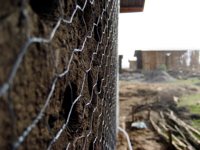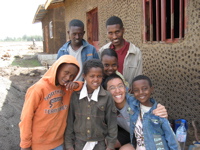derek tsang
A cost of charity
Derek Tsang
In May 2007, I had the privilege of joining a Habitat for Humanity Global Village team to Debre Berhan, Ethiopia. We spent two weeks in Debre Berhan and in that time, we worked on 23 houses and dedicated two dwellings. As a participant on the team, I saw first-hand the poverty in the community, the pressing needs of local villagers, and the lack of modern infrastructure.

The first question that we struggled with was: why not simply send money? The cost of the trip was US$1,500, of which only US$450 was a donation to the local Habitat affiliate. The remainder went towards our transportation, our accommodation, and our food. Wouldn’t we be doing more if our project fee were instead used to build houses? A Habitat house costs US$2,000 from groundbreaking to dedication. How can we justify spending so much money on ourselves, when our two-week trip could have put a roof over a family?
I must remind myself, however, that the trip was not a vacation. We helped construct homes: we dug trenches with rudimentary hand tools, we moved giant rocks that grounded the foundation, we plastered walls with chika (mud), we painted interior walls. For all the sweat and blood that went into the twenty-three homes that we worked on, the entire team of ten volunteers saved the local Habitat affiliate about 120 birr per day – at current exchange rates, that works out to about $13. Certainly, we would be deceiving ourselves if we could justify our US$1,500 extravagance with the petty labour that we had put into the project.

We do, however, contribute to the local economy. When we were not working, we were spending money that went towards local businesses and local labourers. Without foreigners visiting Ethiopia, this influx of money would not exist, and the tourism industry that employs workers and generates incalculable spin-offs would collapse. Indeed, of the US$1,050 that was spent on us, all of it went towards the Ethiopian economy. Yet, the cost of my trip exceeded US$1,500 because of the flight; I spent $1,800 on transportation to Addis Ababa. That money was paid to Air Canada and British Airways, not the Ethiopian economy. Would it have been better to send US$1,500 + $1.800 – an amount equivalent to one-and-a-half houses – directly to Habitat for Humanity, or to have partaken in the trip?
I struggled with this question. But I realized, first of all, that the need for humanitarian aid in Ethiopia and beyond is overwhelming. Not only is there a dire need for decent shelter, but also for other basics such as water treatment and road infrastructure. In places like Darfur, the need for essentials like food and personal security are barely being met. No amount of money that I contribute will rectify this. Not even a charity, with all of its donations and resources, can solve such immense problems. Boundaries must be drawn. If the cost of the trip was instead donated to Habitat, then what else should I donate? The need is almost infinite, but I have finite resources.
Instead, I believe that the Western mentality of handouts needs to be questioned. Economic prosperity in third-world nations cannot come in the form of blind foreign aid from individuals or governments. Habitat homes are not given to homeowners; they are merely subsidized. Locals must apply for a Habitat home through a competitive process, even though the homes come with a substantial mortgage. Prospective homeowners are assessed on the basis of need and ability to pay. It is through such a program, where locals are employed and are able to earn their home, that the community is strengthened and the homeowner is empowered. Instead of sole reliance on foreign handouts, we merely provide the helping hands that build a sustainable, dignified community.
So far, I have ignored one of the biggest strengths of the Global Village program. I could have sent a faceless cheque in the post, which would have built one-and-a-half homes. Instead, I visited the local community, put a face to the great earth that is home to us all, and gave homeowners and families a glimpse at the world beyond Debre Berhan. Our presence on the sun-charred land of Debre Berhan spoke a thousand more words than a cheque ever could. I sensed their initial curiosity of foreigners from a distant land, their excitement and hospitality towards us, and their genuine and sincere gratitude for our help – even though we only did provide labour worth 120 birr per day. There was no need for words – I could see kindness and warmth radiate from their smiles. We loved the homeowners and their families, and they loved us right back. It is my belief that our brief visit to Debre Berhan made far more of an impact on the community than dollars ever could. From a simple soccer game to working hand-in-hand erecting mud walls, we were the reason why the Global Village program is indeed global. We have broken down the walls of political borders and shown the people of Debre Berhan what the rest of the world is about. We have shown that we care.

When friends and family heard that I was going on this trip, one of their first questions was whether all expenses were paid as a volunteer. They all balked at the cost, but I now understand that it is simply impossible to provide an all-expenses-paid trip. The trip was worth every penny for Debre Berhan and me, and I would do it all over again.